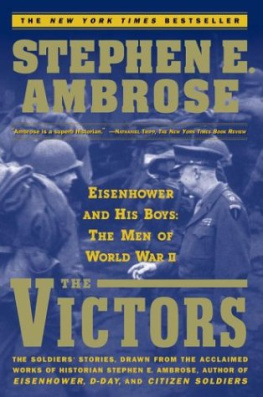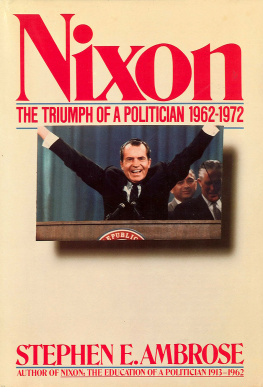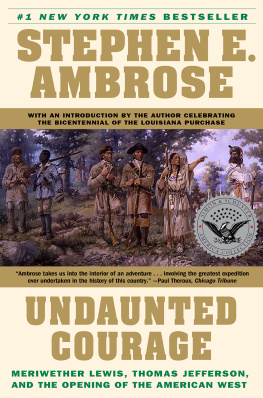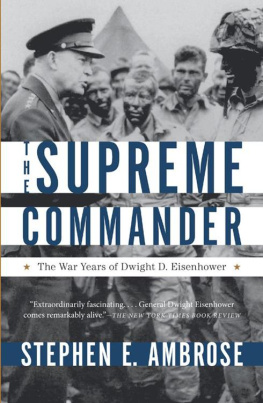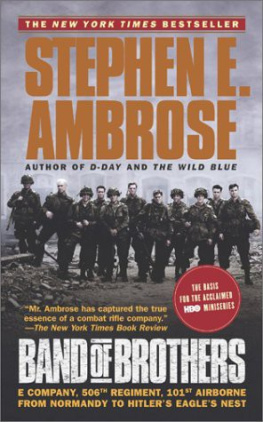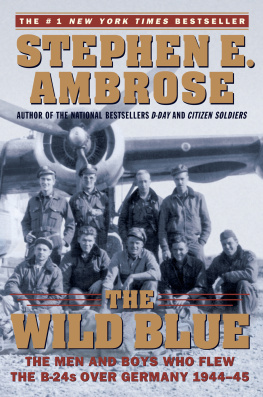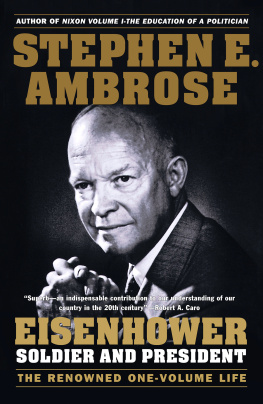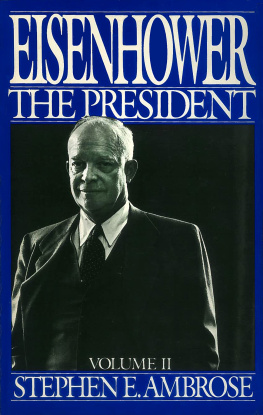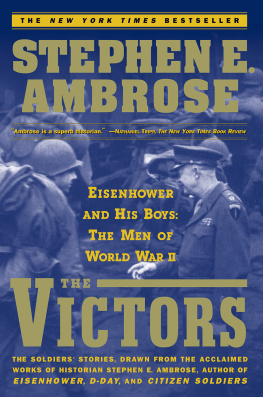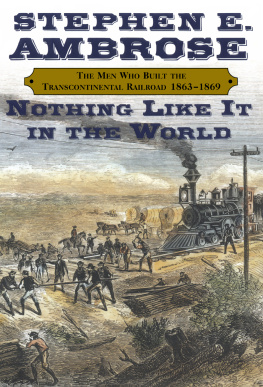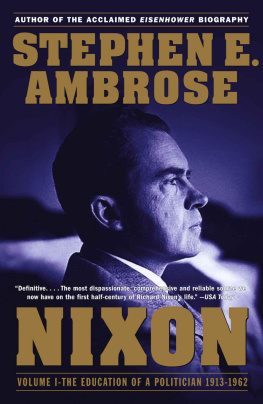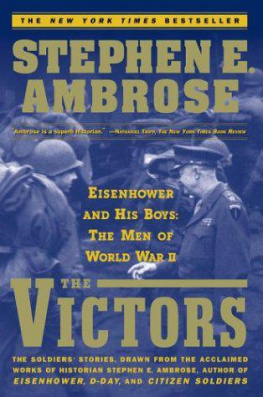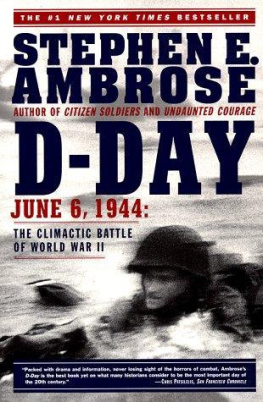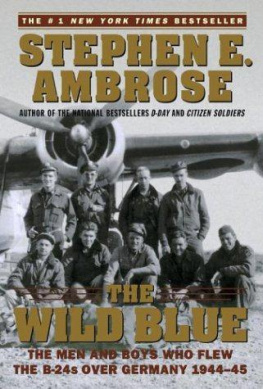Stephen E. Ambrose - The Victors: Eisenhower and His Boys--The Men of World War II
Here you can read online Stephen E. Ambrose - The Victors: Eisenhower and His Boys--The Men of World War II full text of the book (entire story) in english for free. Download pdf and epub, get meaning, cover and reviews about this ebook. year: 2000, publisher: Simon & Schuster, genre: History. Description of the work, (preface) as well as reviews are available. Best literature library LitArk.com created for fans of good reading and offers a wide selection of genres:
Romance novel
Science fiction
Adventure
Detective
Science
History
Home and family
Prose
Art
Politics
Computer
Non-fiction
Religion
Business
Children
Humor
Choose a favorite category and find really read worthwhile books. Enjoy immersion in the world of imagination, feel the emotions of the characters or learn something new for yourself, make an fascinating discovery.
- Book:The Victors: Eisenhower and His Boys--The Men of World War II
- Author:
- Publisher:Simon & Schuster
- Genre:
- Year:2000
- Rating:4 / 5
- Favourites:Add to favourites
- Your mark:
- 80
- 1
- 2
- 3
- 4
- 5
The Victors: Eisenhower and His Boys--The Men of World War II: summary, description and annotation
We offer to read an annotation, description, summary or preface (depends on what the author of the book "The Victors: Eisenhower and His Boys--The Men of World War II" wrote himself). If you haven't found the necessary information about the book — write in the comments, we will try to find it.
The Victors: Eisenhower and His Boys--The Men of World War II — read online for free the complete book (whole text) full work
Below is the text of the book, divided by pages. System saving the place of the last page read, allows you to conveniently read the book "The Victors: Eisenhower and His Boys--The Men of World War II" online for free, without having to search again every time where you left off. Put a bookmark, and you can go to the page where you finished reading at any time.
Font size:
Interval:
Bookmark:

Eisenhower and His Boys: The Men of World War II
THE VICTORS
Stephen E. Ambrose
Portions of this work were previously published in Eisenhower, Pegasus Bridge, Band of Brothers, D-Day,and Citizen Soldiers.
FOR ELIZABETH STEIN
TABLE OF CONTENTS
Introduction
1 - Preparation
2 - Getting Started
3 - Planning and Training for Overlord
4 - OK, Lets Go
5 - The Opening Hours of D-Day
6 - Utah Beach
7 - Omaha Beach
8 - Pointe-du-Hoc
9 - The British and Canadian Beaches
10 - The End of the Day
11 - Hedgerows
12 - Breakout and Pursuit
13 - At the German Border
14 - Metz, Aachen, and the Hurtgen
15 - The Battle of the Bulge
16 - Night on the Line
17 - The Rhineland Battles
18 - Overrunning Germany
19 - The GIs
Sources
Bibliography
Copyright
Also by Stephen E. Ambrose
Introduction
MY EXPERIENCES with the military have been as an observer. The only time I wore a uniform was in naval ROTC as a freshman at the University of Wisconsin, and in army ROTC as a sophomore. I was in second grade when the United States entered World War II, in sixth grade when the war ended. When I graduated from high school in 1953, I expected to go into the army, but within a month the Korean War ended and I went to college instead. Upon graduation in 1957, I went straight to graduate school. By the time America was again at war, in 1964, I was twenty-eight years old and the father of five children. So I never served. But I have admired and respected the men who did fight since my childhood. When I was in grade school World War II dominated my life. My father was a navy doctor in the Pacific. My mother worked in a pea cannery beside German POWs (Afrika Korps troops captured in Tunisia in May 1943). Along with my brothers-Harry, two years older, and Bill, two years younger-I went to the movies three times a week (ten cents six nights a week, twenty-five cents on Saturday night), not to see the films, which were generally real clinkers, but to see the newsreels, which were almost exclusively about the fighting in North Africa, Europe, and the Pacific. We played at war constantly: Japs vs. marines, GIs vs. Krauts.
In high school I got hooked on Napoleon. I read various biographies and studied his campaigns. As a seventeen-year-old freshman in naval ROTC, I took a course on naval history, starting with the Greeks and ending with World War II (in one semester!). My instructor had been a submarine skipper in the Pacific and we all worshiped him. More important, he was a gifted teacher who loved the navy and history. Although I was a premed student with plans to take up my fathers practice in Whitewater, Wisconsin, I found the history course to be far more interesting than chemistry or physics. But in the second semester of naval ROTC, the required course was gunnery. Although I was an avid hunter and thoroughly familiar with shotguns and rifles, the workings of the five-inch cannon baffled me, so in my sophomore year I switched to army ROTC. Also that year, I took a course entitled Representative Americans taught by Professor William B. Hesseltine. In his first lecture he announced that in this course we would not be writing term papers that summarized the conclusions of three or four books; instead, we would be doing original research on nineteenth-century Wisconsin politicians, professional and business leaders, for the purpose of putting together a dictionary of Wisconsin biography that would be deposited in the state historical society. We would, Hesseltine told us, be contributing to the worlds knowledge.
The words caught me up. I had never imagined I could do such a thing as contribute to the worlds knowledge. Forty-five years later, the phrase continues to resonate with me. It changed my life. At the conclusion of the lecture-on General Washington-I went up to him and asked how I could do what he did for a living. He laughed and said to stick around, he would show me. I went straight to the registrars office and changed my major from premed to history. I have been at it ever since.
As for this book, Alice Mayhew made me do it. Two years ago I sent in to her the manuscript of a book she eventually titledCitizen Soldiers (she picks all my titles, including the one for this book). That was the eleventh manuscript I had sent her-three volumes on Eisenhower, three volumes on Nixon, one on a British airborne company in World War II, one on an American airborne company in that war, one on D-Day, and one on Meriwether Lewis. All but the Nixon volumes and the Lewis book were on war, and there was plenty of war in the second and third Nixon volumes-and Lewis led a military expedition. So when I put the manuscript of what becameCitizen Soldiers in the mail, I promised my wife, Moira, I aint going to study war no more. I had seen enough destruction, enough blood, enough high explosives. To remove temptation, I gave my library of World War II books to the Eisenhower Center at the University of New Orleans. Like the Civil War veterans after Appomattox, like the GIs after the German and Japanese surrenders, I wanted to build. Alice accepted my decision and told me to write a book on the building of the first transcontinental railroad. I loved the idea and put in a year of research. Then Alice called and said I should do a book on Ike and the GIs, drawing on my previous writings to put together a coherent narrative. She said it would be the easiest book Id ever write. That didnt turn out to be so, as there was lots of hard work involved. But it has been the most fun. The challenge of writing a history of the Supreme Commander and the junior officers, NCOs, and enlisted men carrying out his orders-generally ignoring the ranks in between-has given me a new appreciation of both.
The older I get, the more of his successors as generals and presidents I see, the more I appreciate General and President Eisenhowers leadership. And the more I realize that the key to his success as a leader of men was his insistence on teamwork and his devotion to democracy.
General Eisenhower liked to speak of the fury of an aroused democracy. It was in Normandy on June 6, 1944, and in the campaign that followed, that the Western democracies made their fury manifest. The success of this great and noble undertaking was a triumph of democracy over totalitarianism. President Eisenhower said he wanted democracy to survive for all ages to come. So do I. It is my fondest hope that this book, which in its essence is a love song to democracy, will make a small contribution to that great goal.
AT THE BEGINNING of World War II, in September 1939, the Western democracies were woefully unprepared for the challenge the totalitarians hurled at them. The British army was small and sad, the French army was large but inefficient and demoralized from top to bottom, while the American army numbered only 160,000 officers and men, which meant it ranked sixteenth in the world, right behind Romania. The totalitarian armies of Imperial Japan, the Soviet Union, and Nazi Germany, meanwhile, were larger and better prepared than their foes. As a consequence, between the early fall of 1939 and the late fall of 1941, the Japanese in China, Indochina, at Pearl Harbor, and in the Philippines and Malaya; the Red Army in Poland and the Baltic countries; the Germans in Poland, Norway, Belgium, Holland, and France, won great victories. The only bright spots for the democracies were the British victory in the Battle of Britain in the summer and fall of 1940 (but that was a defensive victory only) and Adolf Hitlers decision to attack his ally Joseph Stalin in the spring of 1941. Because of the last two events, the apparently certain totalitarian victory of May 1940 was now in question. Perhaps the democracies would survive, perhaps even prevail and emerge as the victors. That depended on many things, but most of all on the abilities of the British and Americans to put together armies that could challenge the Japanese and German armies in open combat. That required producing leaders and men. How that was done is the central theme of this book. We begin with Dwight David Eisenhower, the man who became the Supreme Commander of the British and American armies that formed the Allied Expeditionary Force. His personality dominated the AEF. He was the man who made the critical decisions. In the vast bureaucracy that came to characterize the high command of the AEF, he was the single person who could make judgments and issue orders. He had many high-powered subordinates, most famously Gen. Bernard Law Montgomery and Gen. George S. Patton, but from the time of his appointment as Supreme Commander to the end of the war, he was the one who ran the show. For that reason, he gets top billing here.
Font size:
Interval:
Bookmark:
Similar books «The Victors: Eisenhower and His Boys--The Men of World War II»
Look at similar books to The Victors: Eisenhower and His Boys--The Men of World War II. We have selected literature similar in name and meaning in the hope of providing readers with more options to find new, interesting, not yet read works.
Discussion, reviews of the book The Victors: Eisenhower and His Boys--The Men of World War II and just readers' own opinions. Leave your comments, write what you think about the work, its meaning or the main characters. Specify what exactly you liked and what you didn't like, and why you think so.

